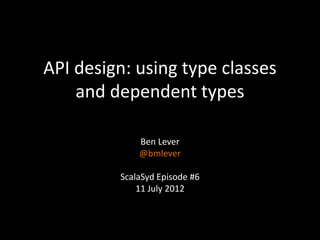
API design for type classes and dependent types
- 1. API design: using type classes and dependent types Ben Lever @bmlever ScalaSyd Episode #6 11 July 2012
- 2. What I want traitComp[A] { ... } Specifies the “computation” of a value of type ‘A’ val ii: Comp[Int] = ... vali: Int = exec(ii) “Execute” the computation specified by ‘ii’.
- 3. What would be cool val ii: Comp[Int] = ... valss: Comp[String] = ... val (i: Int, s: String) = exec(ii, ss) “Execute” multiple computations of different types, then return “embedded” types as a tuple.
- 4. More generally valaa: Comp[A] = ... val bb: Comp[B] = ... valcc: Comp[C] = ... valdd: Comp[D] = ... val (a: A, b: B, c: C, d: D) = exec(aa, bb, cc, dd) Ability to “execute” many computations simultaneously and return all “embedded” values together retaining types.
- 5. But wait, there’s more traitIOComp[A] { ... } Specifies the “IO computation” of a value of type ‘A’ val ii: IOComp[Int] = ... Err[A] vali: Err[Int] = exec(ii) || Either[String, A]) Either return the “Execute” the IO computed value computation or an error string specified by ‘ii’.
- 6. And of course val ii: IOComp[Int] = ... valss: IOComp[String] = ... val (i: Err[Int], s: Err[String]) = exec(ii, ss) “Execute” multiple IO computations of different types, then return “embedded” types as a tuple.
- 7. Finally valaa: Comp[A] = ... val bb: IOComp[B] = ... valcc: Comp[C] = ... valdd: IOComp[D] = ... val (a: A, b: Err[B], c: C, d: Err[D]) = exec(aa, bb, cc, dd) “Execute” a mixture of normal and IO computations.
- 8. Teaser - the final API defexec[R](v: R)(implicit runner: Runner[R]): runner.Out
- 9. My inspiration “Couldn’t you use HLists/KLists for this?” Miles Sabin’s Shapeless provided much direction and inspirations But … I’m not going to talk about Shapeless
- 10. The tricks defexec[R](v: R)(implicit runner: Runner[R]): runner.Out Tuple Type Dependent sweetness classes types
- 11. Trick #1: tuple sweetness defecho[A](x: A) { prinln(x) } echo((“good”, 47, true)) echo(“good”, 47, true) // equivalent
- 12. Trick #2: type classes Get the “size” of an object size(3) // 3 size(“hello”)// 5 size(false)// 1 ...
- 13. Size type class traitSize[T] { defapply(in: T): Int Type class } object Size { defsize[S](v: S)(implicits: Size[S]): Int = s(v) implicit defIntSize = newSize[Int] { defapply(in: Int): Int = in } implicit defBoolSize = newSize[Boolean] { defapply(in: Boolean): Int = 1 Type class instances } implicit defStringSize = newSize[String] { defapply(in: String): Int = in.length } }
- 14. Under the hood Implicit objects inserted by compiler size(3)(IntSize)// 3 size(“hello”)(StringSize)// 5 size(false)(BoolSize)// 1 ...
- 15. Expanding the example Now, get the “size” of multiple objects at once size(3, “hello”,false)// (3,5,1)
- 16. Runner type class traitRunner[In, Out] { defapply(in: In): Out } object Runner { defsize[I, O](v: I)(implicitr: Runner[I, O]): O = r(v) implicit def Tup1[T1](implicit s1: Size[T1]) = new Runner[T1, Int] { defapply(in: T1): Int = s1(in) Referencing } ‘Size’ implicit def Tup2[T1,T2](implicit s1: Size[T1], s2: Size[T2]) = new Runner[(T1,T2), (Int,Int)] { defapply(in: (T1,T2)): (Int,Int) = (s1(in._1), s2(in._2)) } implicit def Tup3[T1,T2,T3](implicit s1: Size[T1], ...
- 17. Under the hood Implicit object inserted by compiler size(3, “hello”,false) (Tup3 IntSize, StringSize, BoolSize))
- 18. Aside: type class sugar defsize[S](v: S)(implicitsizer: Size[S]): Int is equivalent to defsize[S : Size](v: S) : Int Type class constraint
- 19. ‘size’ is easy Runner instances know output types are always Ints Returns Int size(3, “hello”,false)// (3,5,1) Returns Int Returns Int
- 20. ‘exec’ is harder Output types are always different Returns Returns Err[B] Err[D] exec(aa, bb, cc, dd) Returns A Returns C
- 21. Exec type class traitExec[In, Out] { defapply(in: In): Out } object Exec { implicit defcompExec[A] = newExec[Comp[A], A] { defapply(in: Comp[A]): A = execute(in) } implicit defioCompExec[A] = newExec[IOComp[A], Err[A]] { defapply(in: IOComp[A]): Err[A] = ioExecute(in) } }
- 22. Updated Runner type class Runner return type is dependent on Exec return type traitRunner[In, Out] { defapply(in: In): Out } object Runner { defexec[I,O](v: I)(implicitr: Runner[I,O]): O = r(v) implicit def Tup1[T1](implicit ex1: Exec[T1,?]) = new Runner[T1, ?] { defapply(in: T1): ? = ex1(in) } Needs to be ... dependent on ex1
- 23. It gets worse implicit def Tup2[T1,T2](implicit ex1: Exec[T1,?], ex2: Exec[T2,?]) = new Runner[(T1,T2),(?,?)] { defapply(in: (T1,T2)): (?,?) = (ex1(in._1), ex2(in._2)) } ...
- 24. Trick #3: Dependent types Dependent types are types where the realization of the type created is actually dependent on the values being provided. (SCALABOUND)
- 25. Type parameters vs members traitExec[In, Out] { Type parameter defapply(in: In): Out } is equivalent to traitExec[In] { typeOut Type member defapply(in: In): Out }
- 26. Exec using type members traitExec[In] { typeOut defapply(in: In): Out } object Exec { implicit defcompExec[A] = newExec[Comp[A]] { typeOut = A defapply(in: Comp[A]): A = execute(in) } implicit defioCompExec[A] = newExec[IOComp[A]] { typeOut = Err[A] defapply(in: IOComp[A]): Err[A] = ioExecute(in) } }
- 27. Using dependent method types traitRunner[In] { typeOut defapply(in: In): Out Return type is dependent on } ‘r’. Access type as a member. object Runner { defexec[R](v: R)(implicitr: Runner[R]): r.Out = r(v) implicit def Tup1[T1](implicit ex1: Exec[T1]) = new Runner[T1] { typeOut = ex1.Out defapply(in: T1): ex1.Out = ex1(in) } Return type is dependent on ... ex1’s return type
- 28. And again implicit def Tup2[T1,T2](implicit ex1: Exec[T1], ex2: Exec[T2]) = new Runner[(T1,T2)] { typeOut = (ex1.Out, ex2.Out) defapply(in: (T1,T2)): Out = (ex1(in._1), ex2(in._2)) } ...
- 29. Remember -Y Dependent method types are still experimental! (but “turned-on” in 2.10.x) -Ydependent-method-types